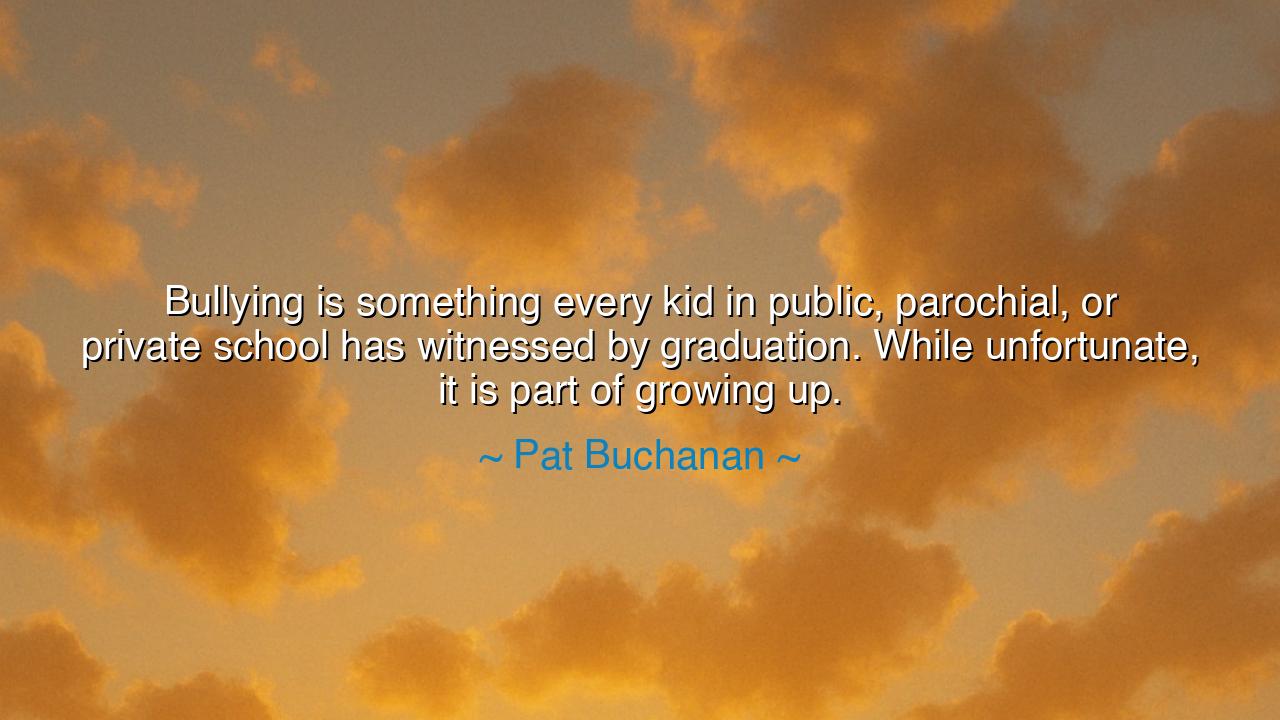
Bullying is something every kid in public, parochial, or private
Bullying is something every kid in public, parochial, or private school has witnessed by graduation. While unfortunate, it is part of growing up.






Hear now the somber and reflective words of Pat Buchanan, a voice forged in the fires of political debate yet tempered by the understanding of human nature: “Bullying is something every kid in public, parochial, or private school has witnessed by graduation. While unfortunate, it is part of growing up.” Though these words may stir unease, they are not meant to justify cruelty, but to remind us that hardship and cruelty are woven into the fabric of human growth — that the trials of youth, painful as they are, are also the crucibles in which strength, empathy, and resilience are forged.
The meaning of this quote lies in its acknowledgment of reality rather than its acceptance of it. Buchanan speaks not to glorify bullying, but to recognize it as a shadow that follows every light of human interaction. From public schools to private academies, no place of learning is untouched by the darker impulses of pride, fear, or insecurity. To witness such behavior — to be its victim, its perpetrator, or its silent observer — is, tragically, a universal part of the human experience. Yet within this truth lies an ancient paradox: the very pain that wounds can also awaken compassion; the very struggle that humbles can also strengthen.
The origin of Buchanan’s reflection springs from his keen observation of society’s moral landscape. A commentator shaped by decades of public discourse, he often sought to confront the world as it is, not as we wish it to be. His statement reflects the belief that the path to maturity is rarely smooth — that by graduation, every child has seen not only kindness but also cruelty, not only friendship but also betrayal. These are the lessons unspoken by teachers yet deeply impressed upon the soul. To grow up is to walk through the garden of virtue and the thorns of vice alike, and to emerge — if one learns rightly — wiser, humbler, and more human.
Consider, O reader, the story of Theodore Roosevelt, the young boy who was frail, sickly, and mocked by stronger children. His weakness drew the sting of bullying, and for a time, his heart was heavy with shame. But rather than succumb, he transformed his pain into purpose. Through relentless effort, he trained his body and his spirit, saying, “I will make my body.” In doing so, he became not only a man of power but a man of moral courage — one who later spoke out against bullies in all forms, whether in playgrounds or in politics. His story echoes the truth of Buchanan’s words: that though bullying is a harsh teacher, the lessons it imparts — about courage, justice, and self-worth — can, if rightly understood, give rise to greatness.
Yet Buchanan’s statement also carries a warning: that to treat cruelty as inevitable must not lead to indifference. It is one thing to accept that hardship exists; it is another to permit it to thrive. The wise know that the task of each generation is not to erase struggle, but to refine it — to turn conflict into understanding, competition into cooperation, and pain into empathy. Every student who has seen or endured bullying carries a choice into adulthood: to repeat the cycle of cruelty, or to break it by becoming a protector of the weak. Thus, the test of character lies not in whether one has suffered, but in what one does with that suffering.
The lesson, then, is that while pain may accompany growth, it should never define it. To grow up is to learn both the light and shadow of human nature — to recognize that the world contains cruelty, but that it also offers the chance to rise above it. When Buchanan says it is “part of growing up,” he speaks to the inevitability of imperfection in human society. But it is for each soul to decide how that imperfection shall shape them. The strong are not those who have never been hurt, but those who have turned their wounds into wisdom. The just are not those who have never witnessed evil, but those who, having seen it, resolve to stand against it.
So, O listener, take this teaching as both caution and call: understand that life’s trials — even those born of cruelty — are not without purpose. But do not glorify pain nor accept injustice as destiny. Let the memories of your own schoolyard battles, whether fought in silence or defiance, become the foundation of empathy for others. Remember how it felt to be unseen, and therefore vow to see others. Remember how it felt to be hurt, and therefore vow to heal. For the world will always have its bullies — but it will also have those who, forged by hardship, become guardians of kindness. And that, above all, is the noblest kind of graduation: not from school, but from innocence into wisdom, from self-preservation into compassion, from suffering into strength.






AAdministratorAdministrator
Welcome, honored guests. Please leave a comment, we will respond soon